S02 Episode 9: China Dreams of Electric Words
The curious case of the “Electronic Dictionary”: BBK master race + dither punk sinofuturism + playdating for two decades + homebrew tamagotchi
In the house this week: Jesse, Emily, Tianyu, Yan, Yi-Ling, and Krish.
Krish: Hello. Chinese videogames are having a global moment, and we’ve written two episodes trying to figure out where their quirky sensibilities might come from.
Our answers: Flash games, emulation, console meal replacements, and the liminal space offered by Steam, are all key pieces, but it’s the subject of this episode that really completes the picture.
In the 90s and 2000s, English language learning was a huge fengkou, the site of an insane commercial and VC scramble. At the heart of it were electronic dictionaries (电子词典), singularly Chinese computing devices ostensibly meant for language acquisition. In reality, they became so much more: the repository for a whole generation’s private world of notes, virtual pets, sprawling RPGs and coding experiments. Somewhere between a Nintendo DS, Chromebook, Ti-83 Calculator, and a Tamagotchi, electronic dictionaries were wildly popular, extremely customizable, and gleefully modded to support dizzying possibilities.
Their interlaced worlds were foundational to many strands of gaming and game development in China, prefiguring the global rise of smartphones.

Emily: Also, games on electronic dictionaries, which were sold to parents as purely educational devices, represented a really important lure to kids beyond the promise of private worlds: that of transgression, trespass, secrets and provocations.
Krish: Our guide through these nested menus is Jesse Young, a writer and translator in Beijing who has been obsessed with the devices for years. With his sprawling collection assembled through second hand resellers on Taobao, he takes us on a deep-dive through dither-punk RPGs for a look at the legacy and influence of the electronic dictionary in China.
As always, we want to show that the history of games in China is not “partial, belated, or emerging,” but rather a specific result of complex technological trajectories. These trajectories, as Jesse shows below, aren’t just nostalgia fodder but signposts to what a better, more open, and punk af tech future might look like.
The Decade of the Electronic Dictionary
Words and Illustration by Jesse Young
Jesse: Recent pieces in Polygon and Chaoyang Trap both explicated what I’d long intuited: the quiet soft power victory of Chinese video games. This got me into some speculative anthropology around the framing of gaming here—the console ban (2000-2015), games as “spiritual opium,” the current crackdown and video game licensing woes.
Wind back now to the 1980s and the homegrown NES-clone Little Tyrant (小霸王). China’s only big console success story had to position itself as educational hardware. It was a design choice with implications, arguably the start of a new, distinctly Chinese technological idiom. I’d seen a variant of this in Tom Mullaney’s work on The Chinese Typewriter (newly published in Chinese) and early personal computing, and there is a direct line here about how culture informs technology which informs design which informs aesthetics.
In China’s case I think this interplay of technology and aesthetics, responsive to culture, is best exemplified in what I am calling “The Decade of the Electronic Dictionary: 1995-2005.” During these ten years, for a tech savvy cohort of high school and college students, “electronic dictionaries” (电子词典) were the ascendant hardware. Instead of PCs, PDAs or the like, which took off belatedly in a still-developing China, electronic dictionaries were de-facto mini-notebook computers.
Here, electronic dictionaries developed into impressive multifunction devices, sporting their own striking design sensibility and serving as a bridge to smartphones much as PDAs did in the West.
The two leading brands Bubugao (步步高, BBK) and Wenquxing (文曲星) generate the same nostalgic fondness as Palm Pilots and Apple Newtons do (just check Bilibili or second hand platforms like Xianyu 闲鱼). Returning to video games, the most interesting facet may be the largely unexplored legacy of Chinese electronic dictionaries as gaming devices, and their influence on a whole generation of programmers and developers in China.

Electronic dictionaries reigned supreme especially after the millenium, as network capabilities were added and technological convergence elevated the devices into capable MP3 players, e-book readers, handheld gaming machines, graphic calculators, notebooks, programming tools, virtual pets, personal organisers and more, complete with SD card support, USB connectivity and infrared data transfer. To echo educational industry analysis firm Blackboard Insight's (黑板洞察) conclusion on their significance:
“It belonged to a wave. That wave has retreated but its ripples still reverberate...it carries the special complex memories of a whole generation of students.”
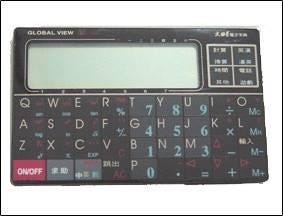
Yan: I’d like to add a bit of context here: one of the biggest anxieties over learning English in China in the late 90s and early 2000s was “Mute English,” or at least that’s what my parents projected on me. This was before pirated and subtitled American TV shows like Friends were widely available for people to watch, and you rarely had access to audio materials of conversations between native English speakers other than textbook recordings. So an electronic device that could read out all the English words for students to check their pronunciation was essential for people who wanted to be able to converse in English rather than just pass English exams, most of which didn’t have a speaking component.
That’s how revolutionary the device wanted to be for English pedagogy in China during that specific period. I had a Wenquxing but I sadly don’t have any memory of learning English with it. All I remember is a cat I raised in the Tamagotchi game that came with the device. In the game, in order to “make money” to buy cat food there’s a simple word game, where you fill in the blanks to complete words. The twist: they were Chinese 成语 (idioms), not English words!
Emily: One of my most prized possessions growing up was this - The 2006 Barbie B-Book. It was marketed as a “learning laptop” for kids to learn 1st/2nd grade English vocabulary through a series of educational games.
A few things to pick apart here: first, the pinkness overload. The target audience was obviously little girls who were already in the Barbie craze phase. I wonder, then, the possibly gendered nature of electronic dictionaries and these B-Book type devices. I, for one, never had any of the aforementioned devices back then. I knew of their existence but I never wanted one, nor have my parents offered to purchase one for me. I’m throwing an idea out there: since our society is inherently gendered, educational hardware is no exception.
Other notable features include the fact that the B-Book is not internet-enabled, even though it is marketed and aesthetically designed to resemble a laptop. It is much less user-driven since the “vocabulary learning” aspect is not actualized through a dictionary function where the user looks up words, but through program-led games. As far as I remember, the B-Book did not have a calculator function, but it does have math-related games. I’m hesitant to definitively argue that these features are sexist and am well aware that previous examples of hardware might be innately different to B-Book (the latter is completely in English). But, it's worth raising here and opening it up for debate. :)
Jesse: Okay, back to the beginning. Electronic versions of text dictionaries have existed since the early 1960s, but the proximate ancestor to the electronic dictionary, a dedicated pocket computer with word search functions, is the “enhanced” electronic calculator. Their invention is often credited to SoftBank founder Masayoshi Son, who made his early fortune by selling designs for an electronic translation device to Sharp (dictionary and translation functions being porous from the outset). This was in 1978, the same year top US calculator maker Texas Instruments’ Speak&Spell signaled an embryonic step into more lexicographic as opposed to numeric territory. Their ‘Language Translator/Tutor’ followed in 1979. Japan would prove the true template for subsequent Chinese forays though, sharing the same computational challenge of handling a character-based writing system and sizable segment of (mostly English) language learners. Sharp’s IQ-3000 debuted in 1979 and was soon met by Casio’s TR-2000 in 1981, coming in at a lightweight 53 grams.
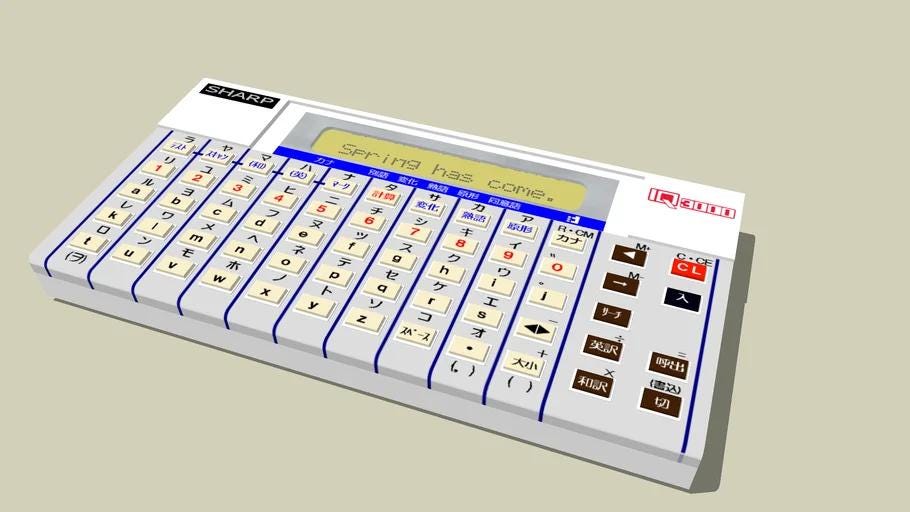
1989 is the watershed year for the Chinese electronic dictionary. Quanzhi International launches the first Chinese electronic dictionary, the EC-1000, under the name Kuaiyitong (快译通), positioning it as a Chinese-English translation tool. They began in Taiwan but by 1990 had started production in Shenzhen for the mainland market. At roughly the same time, a Taiwanese and Hong Kong technology firm joined forces to establish BESTA (好易通) and launched their own electronic dictionary.
These were bougie gadgets costing several thousand kuai, generally out of reach of the laobaixing. An entrepreneur from Taiwan, Zhou Zhiyuan, would be instrumental in changing this. He founded Golden Vision in 1993 with a view to making an affordable, truly mass-market product.
1995’s Wenquxing (文曲星) CC-100, named for a star in the big dipper constellation associated with literary success, debuted at 330 RMB cutting the price of an electronic dictionary by 80% overnight.
The first multi-function electronic dictionary would arrive shortly after in 1997 with Wenquxing’s PC-220. By 2000 Wenquxing dictionaries had accumulated sales of 20 million units and occupied a 70% market share.
It was around this time Duan Yongping, who had invented the educational hardware market with Subor Electronics and the Little Tyrant (小霸王) left to found Bubugao/BBK (步步高) and a second era was born. Network features were added. Backgammon, Snake and Tetris gave way to sprawling RPG games. Programming and game development tools were made available. Intense competition led to a war over games, price and features. Online forums like WQXNET sprang up. Wenquxing fans began calling themselves 星迷 (star fans). And electronic dictionaries became a ubiquitous fact of campus life. By the early 2000s Noah (诺亚舟) had also entered the fray and soon found themselves second only to Wenquxing, with BBK settling into third place. Industry sales peaked at 10 million a year in 2004.

In 2005, an abrupt industry-wide restructure shrank the sector by half. Nokia phones were IN, and the writing was on the wall. Innovation stagnated and a prolonged period of decline had begun. Companies pivoted to hardware based around replicating the classroom experience, like point readers (点读机, basically interactive textbooks) incorporating new video and online capabilities. Bubugao was successful in navigating these winds and remained a market leader, while Wenquxing and Noah floundered and ceded their dominance to new players like Shulang (读书郎) and Best Under Heaven Studying (优学天下), which along with BBK currently control 60% of the educational hardware market.
Electronic dictionaries shed their distinctive character and increasingly came to mimic smartphones and tablets. This culminated in the study tablet (学生平板), a learning-focused ‘distraction-free’ (no games, no browsing the internet) alternative to iPads. Unable to compete with modern multifunction devices, the “superfluous” was pared away. The electronic dictionary became an actual electronic dictionary, exemplified by the no-frills dictionary pen (词典笔). In a complete inversion, classic-style electronic dictionaries are still marketed, but this time the selling point is the lack of games.
Much of what made the electronic dictionary special has been lost, so let’s take a moment to celebrate their manifold delights.


The design of these devices deserves appreciation. They are beautiful, and as the old heuristic goes, what is beautiful is usable. You can witness the evolution of form-factor in the image below. From a flat credit-card shape with a calculator-like display to a more rounded clamshell flip-design not dissimilar to a Nintendo DS. Other models and brands experimented with a diversity of novel features including touch-screens, a second-screen on the case with music controls, handwriting input, insertable cartridge support and more.

Their beauty lies in a delicate dance. To be easy to carry, access quickly, to hold and to use all at once. It's fascinating how, at a UX level, these devices pull off these little clues or 'signifiers' that guide user experience. Even in 2022, cycling through nested menus and functions was immediately legible to me, articularly with my BBK Dictionary King A5—considered the pinnacle of e-dictionary design.
Electronic dictionary keypads are informational dense sites and smart design choices around user input often pay aesthetic dividends. Below you can see the elegant combination of mathematical symbols, Korean, Chinese, English and Japanese on the same keypad. All while avoiding clutter. The menu options are also simple enough to be directly understood without reference to a manual.
These compact machines flip open and present an air of discovery. A learning device should invite possibilities. It should feel personal, and be personalisable. A textbook isn't a dairy, but this is something you can build a connection with. There is no internet browser—the world it affords you is a private one. Navigation is enhanced by small, often cute graphic touches. Like the chinese-knot style bordering above. Then there's the quirks—separate password controls for games/personal/music / just about every function (a level of granular parental oversight that screams China).
The dictionaries are riddled with archaic and bizzare turns of phrase, rarely marked as obsolete—for example “sucking the monkey” (Oxford: “the illicit act of using a straw to siphon off rum from its container”). More than one good chuckle was had by making the dictionaries say dirty things in an admirably passable voice. All this adds to the charm factor. There is a thriving second-hand market. The online listings show the kawaii aspects played up, and the fun people have had customising their dictionaries with stickers.
'Electronic dictionaries swept the nation's campuses. Although ostensibly for education, these palm-sized devices also held a hidden gaming function that parents rarely knew.'
Gaming Research Society ( 游戏研究社), in a 2020 retrospective
The untold gaming dimension to Chinese electronic dictionaries is particularly ripe for excavation now. What is old is most definitely new with 1bit graphics. The same binary black-and-white LCD screen pixel art of electronic dictionaries is in the midst of a revival. There is even a new handheld gaming device, The Playdate, built entirely around this aesthetic. It’s enough of a trend to even have a label, ‘dither-punk,’ named for the computer graphics term of patterning pixels to give the illusion of shading or colour depth. Using emulators, I have captured footage and compiled my own top 8 list of classic Chinese electronic dictionary games below.
In many ways gaming was the real draw of these devices, as the same Gaming Research Society article put it, “Chinese children saw electronic dictionaries as gaming consoles, downloading learning software in front of their parents and lining up with classmates at stores near their schools to download the latest games.”
Gaming helped foster committed and dedicated fanbases. One that was locked in, much like the walled gardens of today. Numerous forums sprang up offering homebrew apps and games. The official sites gave a lot of support too, actively encouraging the community through sponsorship of development contests or else hiring talented programmers from the community pool. I was still able to effortlessly download the relevant firmware and lessons for my 17+ year old BBK dictionary on the official site, fully compatible with my Windows 10 PC. Proof of an acknowledgement of the ongoing value of these dictionaries to a subset of people. Further borne out by the fact that most of the 8 games I describe below have seen endless remakes, sequels, spin-offs and fan tributes, and new versions continue to be made. There are Wenquxing and BBK emulators for PCs, 3DSes, Androids and iPhones, among other systems.
Hobbyist programmers of electronic dictionary games have found lasting professional careers in game development. While many of the OG forums have been lost to link rot, new communities such as Edic.Club have surfaced in recent years to preserve the files and development tools for these systems.
Top 8 Classic Chinese Electronic Dictionary Games
1/ 英雄坛说 Altar of Heroes
System: Wenquxing
Description: Wenquxing's killer app, an open-world RPG first playable on the NC1020 (2003) and preloaded on Wenquxing dictionaries thereafter. Early iterations lifted sprites from Pokémon. Presenting a complex world centred on various schools of martial arts, NPCs were based on a rogue's gallery of figures from history, comics and Wuxia novels.
2/ 伏魔记 Record of Exorcism
System: BBK
Description: Bubugao's answer to Altar of Heroes. Released in 2004, there were over 100,000 downloads on BBK's official forum and people lining up at download spots at offline stores to get the game. A free development kit, BBKRPG, was released afterwards. One of the creators continues to work in game development to this day.
3/ 魔塔 Magic Tower
System: BBK
Description: Puzzle-action game originating in 1994 in Japan about ascending a tower with a typical ‘save the princess’ plot. A local 21-story variant took off in China and was later ported to BBK. Reaching the top requires memorisation of enemy and item positions to chart an optimal path. Countless versions exist including a 2016 remake titled Magic Tower - Never Again.
4/ 三国霸业 Three Kingdoms Supremacy
System: BBK
Description: Three Kingdoms’ based strategy games are a mainstay of Chinese gaming (right back to the Huarong Pass wooden sliding puzzle). This adopts elements from several popular Three Kingdoms turn-based titles which makes for surprising depth in such an unassuming package.
5/ 十字这门Cross Entry
System: BBK
Description: Accessible development tools came later to BBK (with BBKRPG) and it seems less major titles were developed than for Wequxing. Most were simple student games or ports of existing games like Pokémon or Phoenix Wright: Ace Attorney. This RPG seems to be one of more significant undertakings post-Record of Exorcism.
6/ 神州 Shenzhou
System: Wenquxing
Description: Large-scale fantasy RPG with multiple endings and hidden easter eggs. Shenzhou was the first winner of Golden Vision’s own GVmaker programming contest, netting 5000 yuan. And the Shenzhou ‘space-time’ engine went on to become the standard development tool for later RPGs on the system.
7/ 蛙蛙大富翁 Frog Monopoly
System: Wenquxing
Description: China has seen various digital adaptations and ‘sequels’ to the classic boardgame Monopoly. Taking on local flavour with mechanics around the God of Luck, God of Fortune and such. This version by 'Lee', a prominent member in the original Wenquxing development scene, is apparently based on Monopoly 4? Great diversion that supports a map editor and decent opponent AI.
8/ 宇星外传翼剑天殇 Extraterrestrial Wing Sword Tianshang
System: Wenquxing
Description: One of the late post-Shenzhou RPGs for the Wenquxing and part of the same group of developers. Out of a myriad of community-developed RPGs this one stands out for its high production-values. Although it never became as popular as its bigger cousins.
Jesse: Wrapping up, electronic dictionaries are unique to China’s timeline of consumer hardware, with no exact parallel anywhere else. They are beautiful to admire and still hold several lifetimes worth of linguistic knowledge. They remain usable. They are central to the birth of China's game development scene, though none of their original titles are much known outside the country.
Now the stars seem to be aligning. The government's recent “two-reductions” 双减 policy that has gutted the private education sector has also driven serious tech-titan investment into the educational hardware space, seeing new translation devices from the likes of Baidu, iFlytek and Netease. 2020 saw the Youdao Super Dictionary, a return to a more traditional clamshell form-factor and the feature-set of a classic electronic dictionary, updated for today.
More processing power, cloud services, shinier screens, computer vision and AI technology presents a vision of an electronic dictionary still at the cutting edge. The use case is still there—a portable, personal device with efficient learning tools.
The private gardens and parallax worlds of learning on an electronic dictionary are far too evocative to be reduced to another iPad app. 27 years on, China is still dreaming of electric words.
Yi-Ling: Curious to see whether or not any of the EdTech giants who got gutted after “Double Reduction” will pivot to the educational hardware space. Does it count as an afterschool tutor…if you get a hand-held, automated bot that teaches you logic 101 through a gamified lesson, instead of a New Oriental teacher who teaches you middle-school algebra?
Tianyu: The popularization of electronic dictionaries enabled the success of Chinese consumer hardware brands. Jesse mentions that Duan Yongping left Subor in 1995 to found BBK Electronics, selling gaming handsets to Chinese children by convincing the parents that these gadgets were, in fact, for learning English.
The Dongguan-based BBK was restructured in 1999 into three subsidiaries: BBK Education continued to make educational gadgets like electronic dictionaries and “reading machines” (点读机); BBK Audiovisual turned to making consumer-grade VCD and DVD players; BBK Communications focused on making telephones and later smartphones. Under Tony Chen (陈明永), BBK Audiovisual later became OPPO in the early 2000s, first manufacturing MP3 players before making cell phones. Shen Wei’s (沈炜) BBK Communications made BBK “music phones” (音乐手机), later rebranded as vivo.
In 2013, former executive Peter Lau (刘作虎) left OPPO to start OnePlus as a subsidiary; in 2018 OPPO’s former VP Sky Li (李炳忠) founded realme, another smartphone brand. Both spinoffs target overseas markets and remain part of BBK’s supply chain. When added all up BBK (which claims that all these brands operate independently, despite sharing the same investors) controls a major share of the global smartphone market.
Emily: An intriguing phenomenon in the Chinese entertainment industry that speaks to this piece is the U-turn of reality shows from being purely recreational to being both fun and didactic, due to government crackdown on vices and immorality rampant in M&E industry. Entertainment has to borrow its legitimacy from some added element of public lecturing or the dissemination of correct values. The once beloved celebrity crime-solving variety program Who’s The Murderer (明星大侦探) had to recently transition to become a “law popularization” (普法) show, educating the masses on law and ethics while celebrities tackle a staged murder mystery. In some ways, the pretending-to-be-on-Wenquxing-but-actually-gaming era is never really over.
Krish: Outro music this week is this wonderful playlist (Spotify) of early Chinese punk rock.
It’s assembled by Chaoyang Trap contributor and newsletter favourite Nathanel Amar for his new (French language) book Scream for Life, which takes an ethnographic approach to tell the story of Wuhan and Beijing’s early punk rock scenes.
Here’s a personal favourite rescued from Douban limbo: Eat Truck, a short-lived, combustible, wildly creative “drunk punk” band in Beijing.
TIanyu: Bye!
Jesse Young is fool enough to sell tea in China. He’ll take writer/translator since poet doesn’t pay.
Yan can’t remember the name of her beloved tamagotchi cat =(
Krish’s first computing device was a Sharp YO-100CP, on which he wrote (bad) flash fiction.
Tianyu was too young to have owned an electronic dictionary.
Emily used to carry her B-Book around as a fashion accessory.



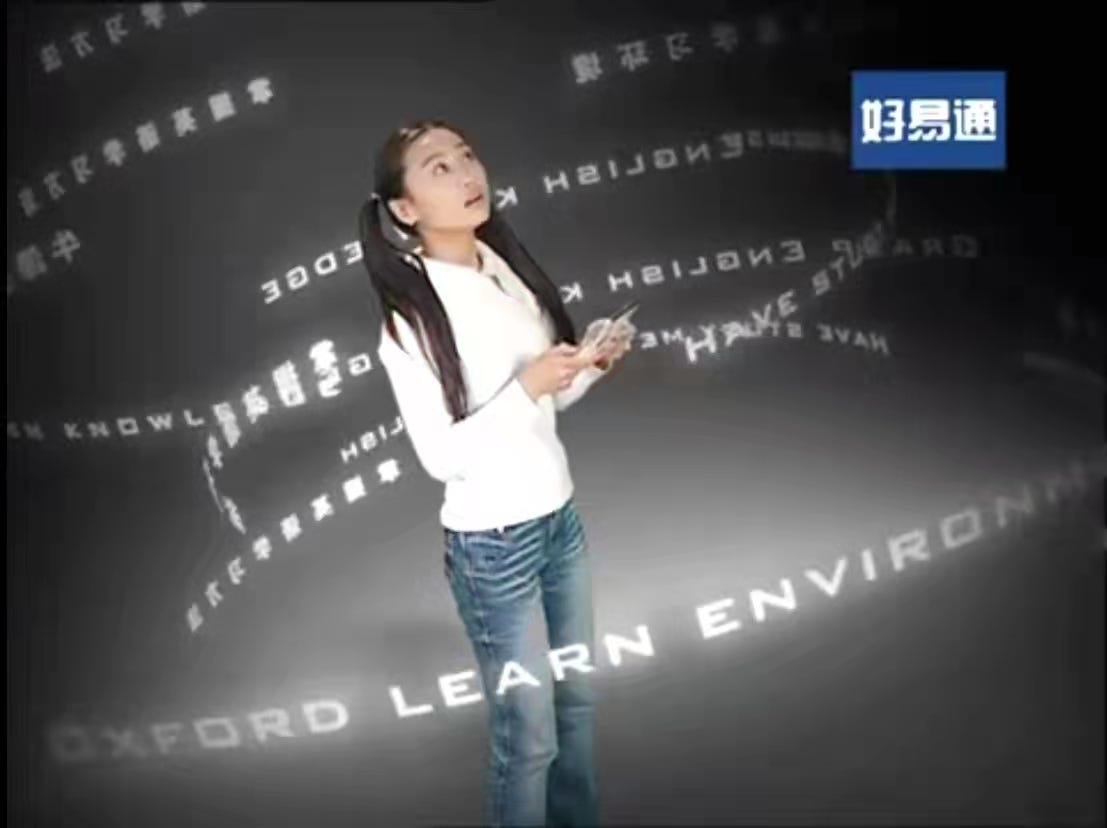
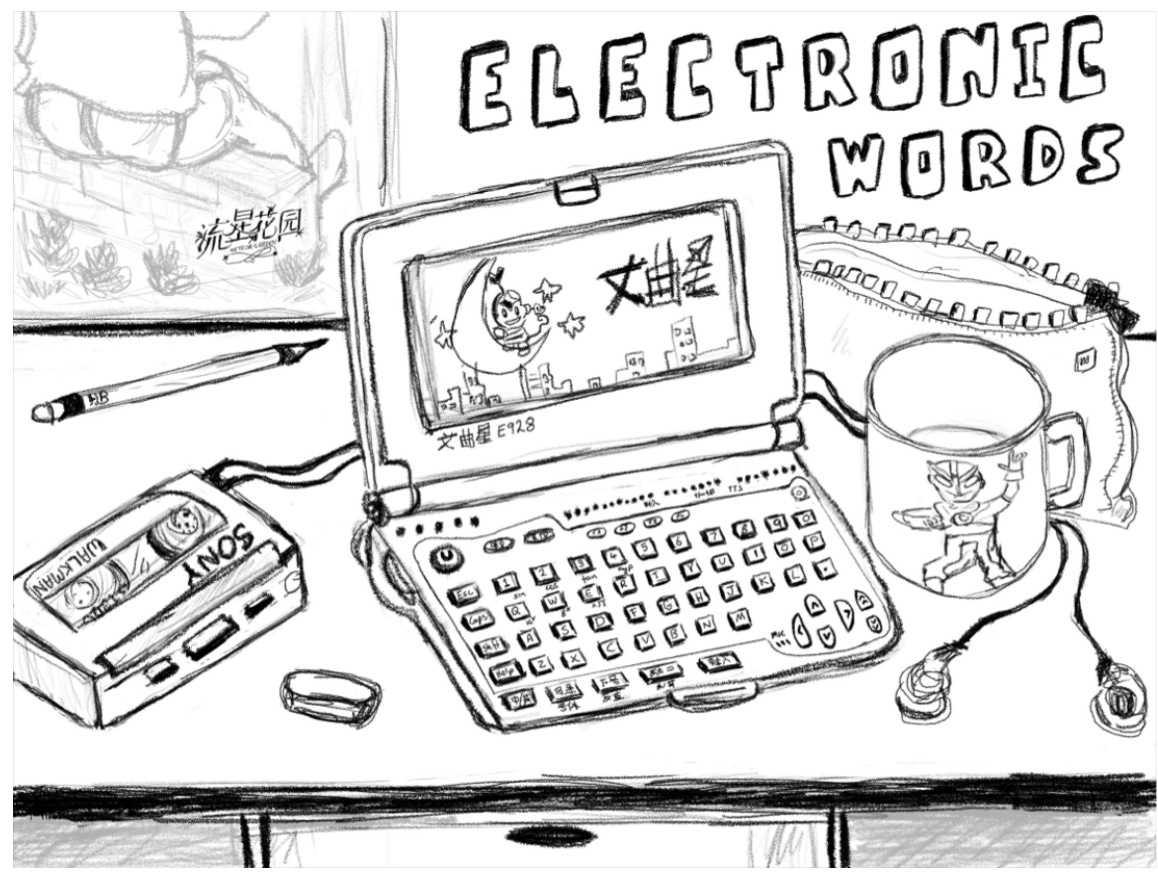



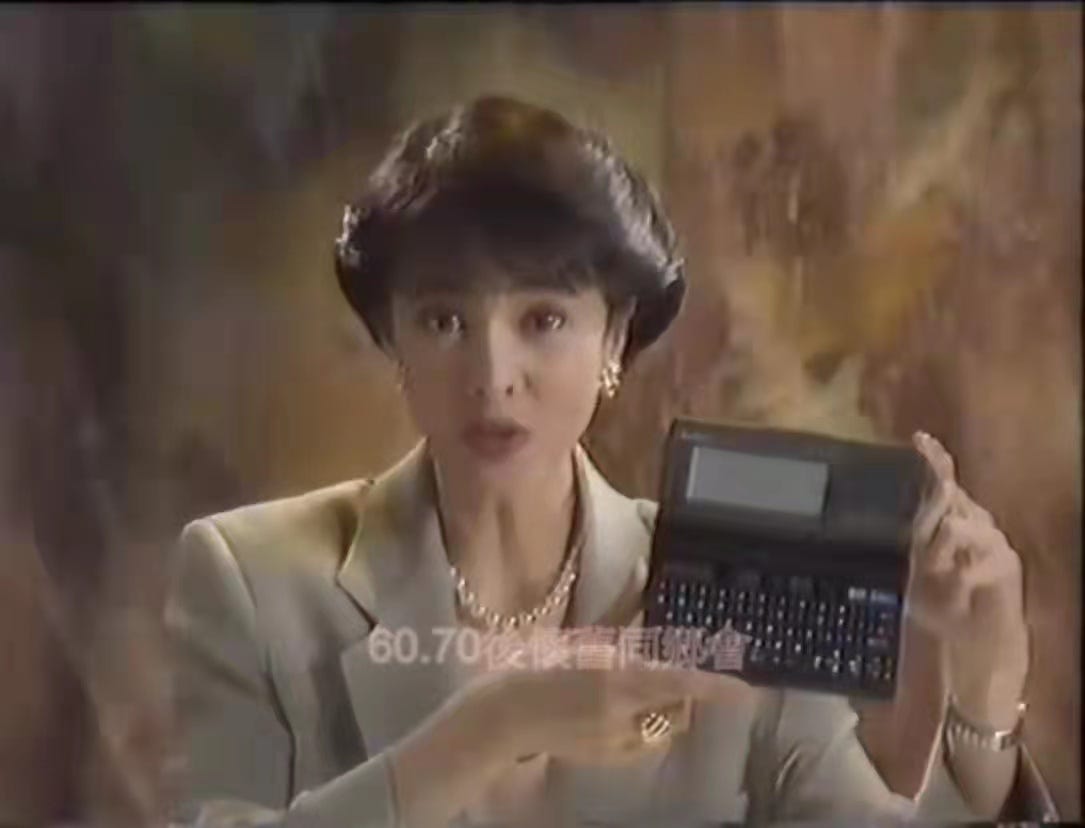
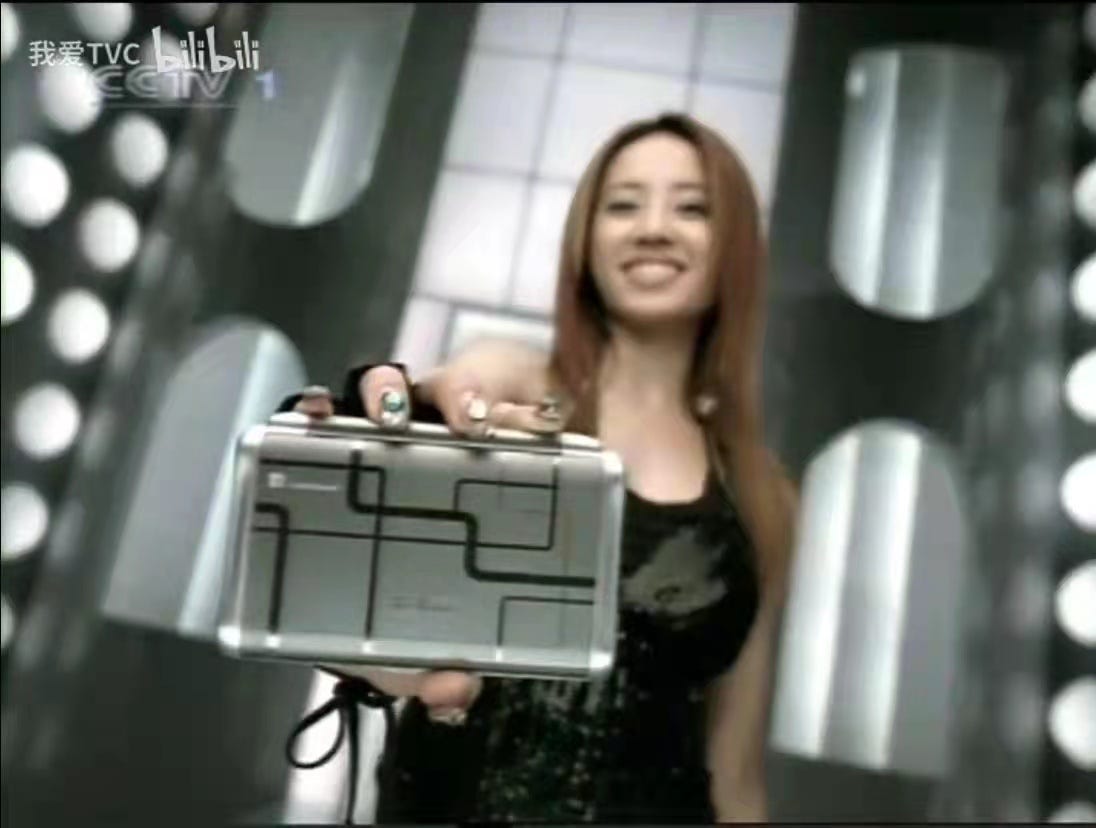
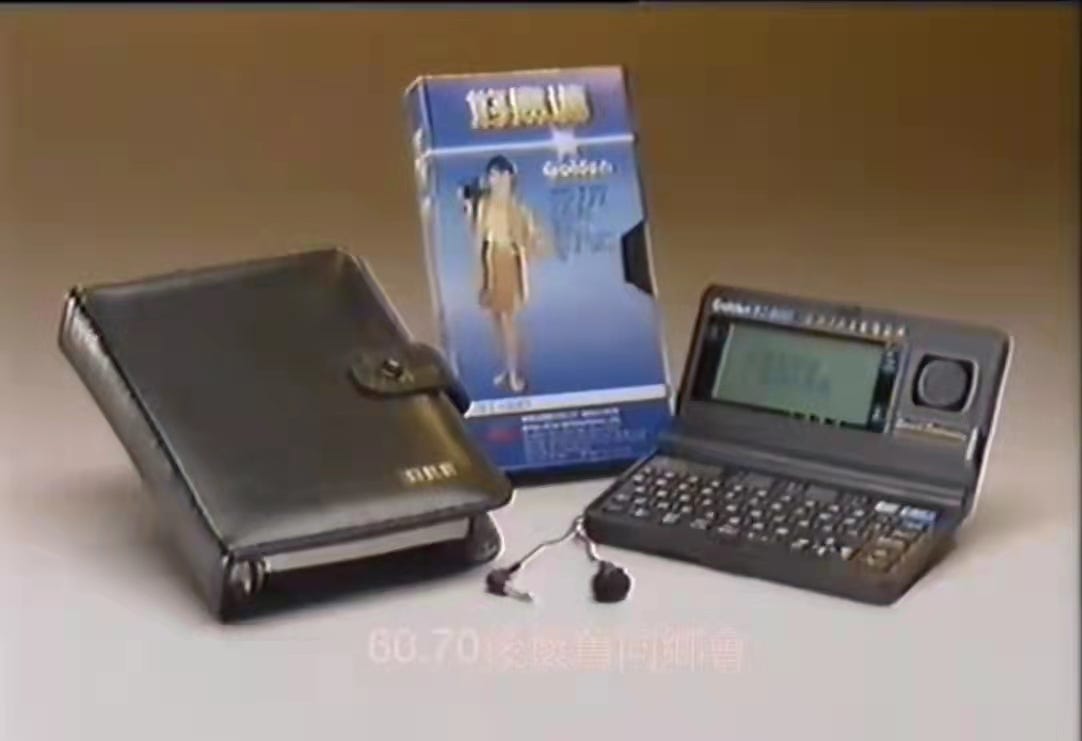
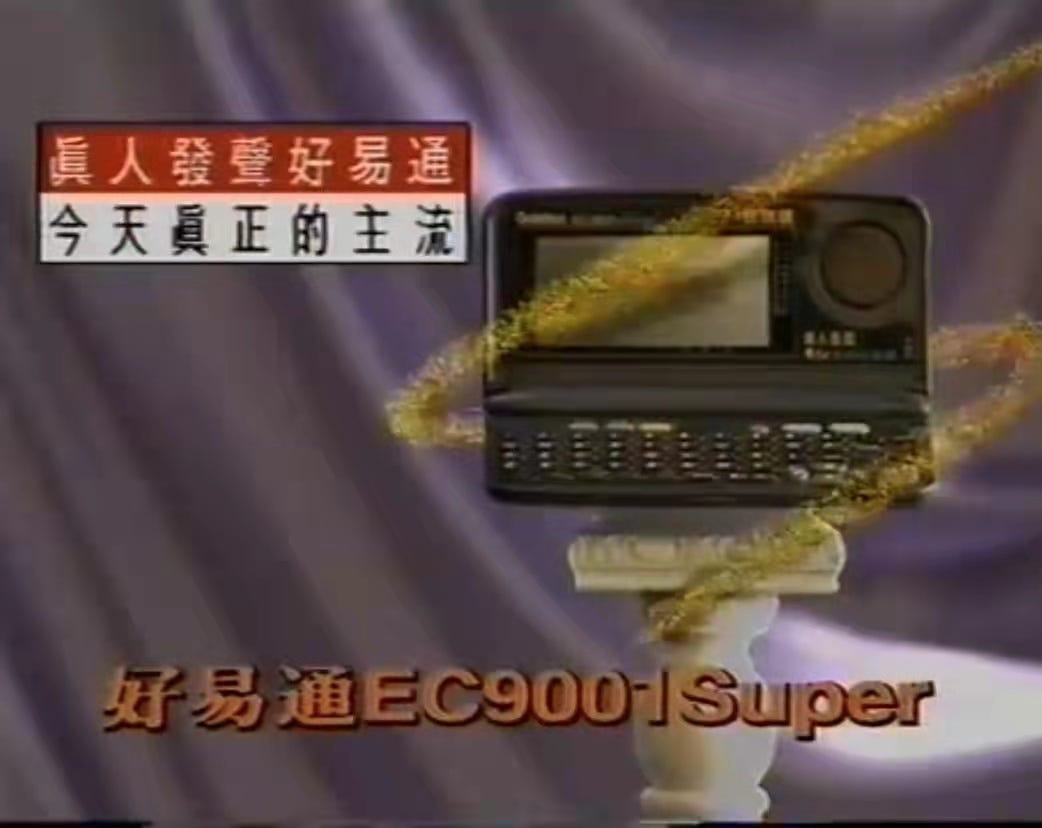





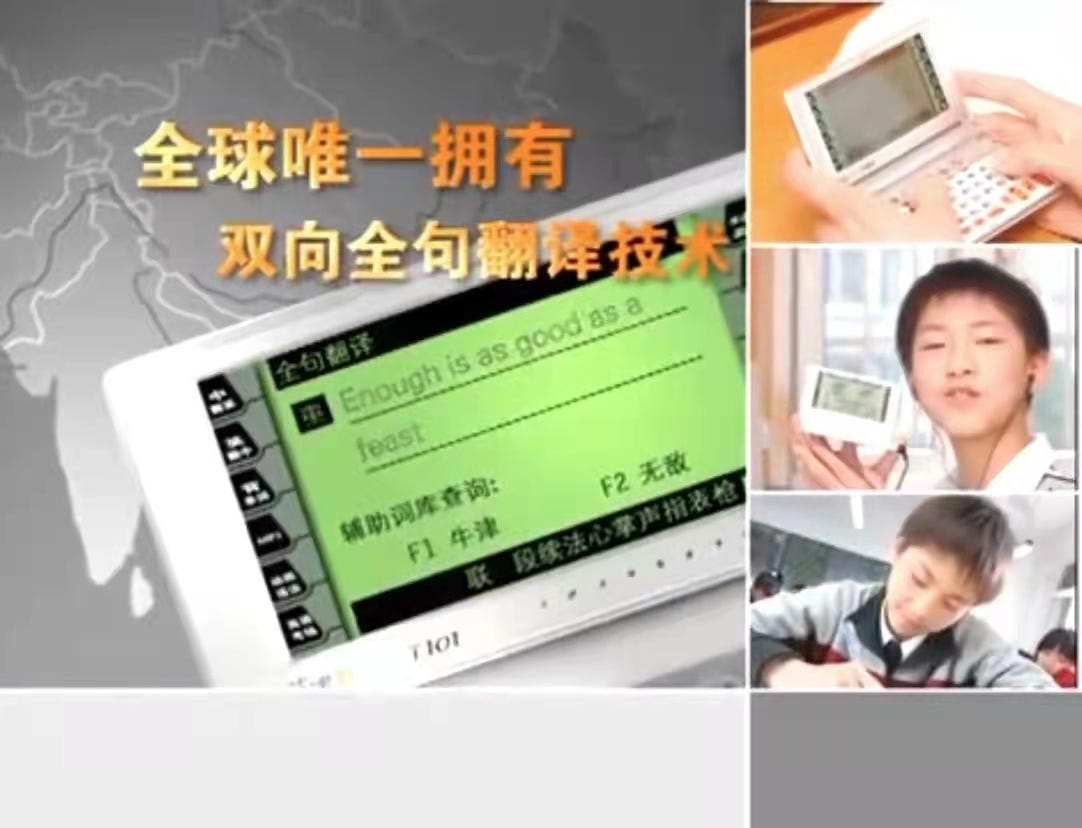
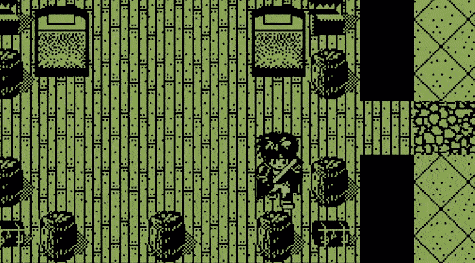







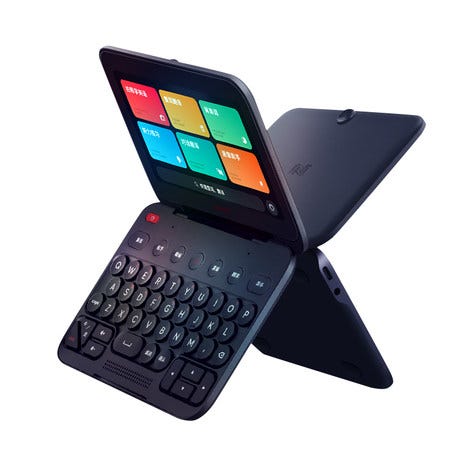



There was this commercial catchphrase for one of 步步高's products:
"步步高点读机,哪里不会点哪里,妈妈再也不用担心我的学习!"
There was this joke that changed it to
步步高打火机,哪里不会烧哪里,妈妈再也不用担心我的学习!
When it comes to homework, there's a pyromaniac inside all of us :)
New reader, but quickly becoming a big fan! For Emily’s notes about the B-Book: my little brother (born in 2005) had two similar “laptop” style gaming devices, one branded with Batman and one branded with Marvel characters. He used them almost daily somewhere in that window between ‘10 and ‘13.
They had all the same features, “language learning” and math-based game programs, but no calculator function or dictionary.
Obviously the exterior/branding of each device was based on sexist marketing & design choices, but I think the functionality of these toys was simply of a lower caliber than electronic dictionaries across the board, even those that were much older. A fascinating comparison though!